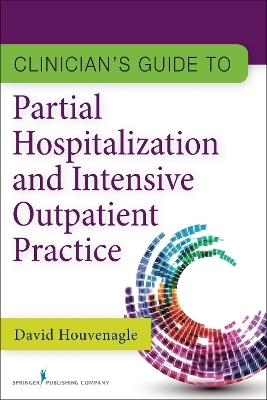
Clinician's Guide to Partial Hospitalization and Intensive Outpatient Practice
Seiten
2015
Springer Publishing Co Inc (Verlag)
978-0-8261-2882-9 (ISBN)
Springer Publishing Co Inc (Verlag)
978-0-8261-2882-9 (ISBN)
- Titel ist leider vergriffen;
keine Neuauflage - Artikel merken
Provides clinicians (including social workers, counselors, therapists, and psychiatric nurses) new to partial hospitalization and intensive outpatient practice settings with a conceptual framework and practical skills for effective and efficient practice. It helps clinicians to develop realistic expectations for treatment in a managed care environment with limited time and funding.
As inpatient psychiatric facilities face bed shortages and increasingly limited insurance coverage for their programs, partial hospitalization and intensive outpatient programs are growing within the mental health treatment community. This book provides clinicians (including social workers, counselors, therapists, and psychiatric nurses) new to partial hospitalization and intensive outpatient practice settings with a conceptual framework and practical skills for effective and efficient practice. It helps clinicians to develop realistic expectations for treatment in a managed care environment with limited time and funding.
Partial hospitalization and intensive outpatient treatment programs (PHP/IOP) can present particularly stressful environments in which clinicians are typically engaged in multiple treatment processes with groups of diverse patients, all at different points in the treatment process. This book borrows from the ""ecology of games"" concept from political theory to assist clinicians in managing their time to the greatest advantage and providing professional treatment to all patients simultaneously. It describes the key elements of a PHP/IOP program including treatment planning, discharge planning, group therapy, psycho-education, and safety and confidentiality issues. It then addresses challenges unique to specific patient populations in the program-children, adults, older adults, the chronically mentally ill, the chemical dependent, individuals with co-occurring disorders-and offers strategies for coping with the multitude of issues they present.
Key Features:
Provides practical strategies for handling a variety of clinical issues in the PHP/IOP setting
Covers specific problems and treatment planning goals for varied populations
Guides clinicians in developing realistic expectations for treatment in a managed care environment with limited time and funding
Includes chapters dedicated to coping with a death in the program, the personality-disordered patient, and conflicts among staff
As inpatient psychiatric facilities face bed shortages and increasingly limited insurance coverage for their programs, partial hospitalization and intensive outpatient programs are growing within the mental health treatment community. This book provides clinicians (including social workers, counselors, therapists, and psychiatric nurses) new to partial hospitalization and intensive outpatient practice settings with a conceptual framework and practical skills for effective and efficient practice. It helps clinicians to develop realistic expectations for treatment in a managed care environment with limited time and funding.
Partial hospitalization and intensive outpatient treatment programs (PHP/IOP) can present particularly stressful environments in which clinicians are typically engaged in multiple treatment processes with groups of diverse patients, all at different points in the treatment process. This book borrows from the ""ecology of games"" concept from political theory to assist clinicians in managing their time to the greatest advantage and providing professional treatment to all patients simultaneously. It describes the key elements of a PHP/IOP program including treatment planning, discharge planning, group therapy, psycho-education, and safety and confidentiality issues. It then addresses challenges unique to specific patient populations in the program-children, adults, older adults, the chronically mentally ill, the chemical dependent, individuals with co-occurring disorders-and offers strategies for coping with the multitude of issues they present.
Key Features:
Provides practical strategies for handling a variety of clinical issues in the PHP/IOP setting
Covers specific problems and treatment planning goals for varied populations
Guides clinicians in developing realistic expectations for treatment in a managed care environment with limited time and funding
Includes chapters dedicated to coping with a death in the program, the personality-disordered patient, and conflicts among staff
David Houvenagle, PhD, LCSW, has over a decade of experience working in partial hospitalization and intensive outpatient programs in practice and managerial roles. He has worked with all age groups in the partial hospitalization setting. He has worked in residential and outpatient clinical settings in his two decades as a social worker and is a board-approved LCSW supervisor in the State of Kentucky, USA.
| Verlagsort | New York |
|---|---|
| Sprache | englisch |
| Maße | 152 x 229 mm |
| Gewicht | 333 g |
| Themenwelt | Geisteswissenschaften ► Psychologie ► Allgemeines / Lexika |
| Medizin / Pharmazie ► Gesundheitswesen | |
| Medizin / Pharmazie ► Medizinische Fachgebiete ► Psychiatrie / Psychotherapie | |
| Pflege ► Fachpflege ► Neurologie / Psychiatrie | |
| Sozialwissenschaften ► Pädagogik ► Sozialpädagogik | |
| Sozialwissenschaften ► Soziologie | |
| ISBN-10 | 0-8261-2882-3 / 0826128823 |
| ISBN-13 | 978-0-8261-2882-9 / 9780826128829 |
| Zustand | Neuware |
| Haben Sie eine Frage zum Produkt? |
Mehr entdecken
aus dem Bereich
aus dem Bereich
Buch | Spiralbindung (2024)
Urban & Fischer in Elsevier (Verlag)
CHF 47,60


